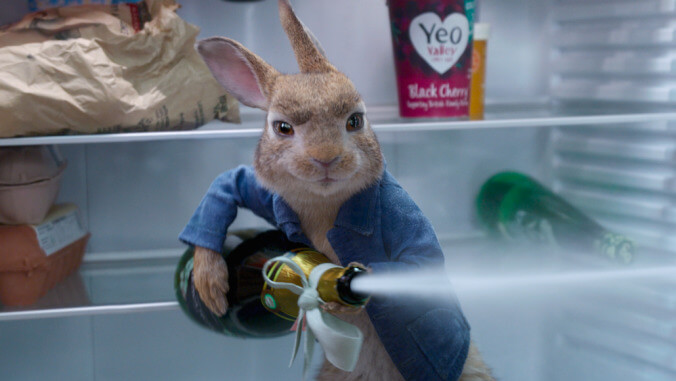If the Peter Rabbit movies actually focused entirely on the romance between animal-loving artist Bea (Rose Byrne, playing a modern-day Beatrix Potter) and the endearingly disagreeable fussbudget Thomas (Domhnall Gleeson), they would paint a portrait of two adults in a sweetly fumbling and unexpected romance, adapting to each other’s quirks as they circle 40. Instead, that painting is a backdrop to the madcap adventures of Peter Rabbit (James Corden), a semi-reformed rascal doing his best to differentiate himself from the poison-worthy antics of Alvin the Chipmunk. Uncharacteristically true to his word, Peter does less insufferable blathering this time around, but the subtitle The Runaway still threatens the audience with a better time.
As the movie opens, Bea and Thomas marry, and then self-publish her book based on Peter. This local success increases Peter’s reputation as a troublemaker even as he’s trying his best to behave; it also attracts the attentions of big-time publisher Nigel (David Oyelowo, matching the likable drollery of his fellow above-this humans), who promises to publish Bea’s future books if she accepts some editorial suggestions. First on his list: playing up Peter’s bad-seed qualities. Peter, frustrated with this pigeonholing, storms off and strikes up a friendship with Barnabas (Lennie James), a larcenous city rabbit who entices Peter into his criminal organization. The gang’s big score: a daring heist of dried fruit from a farmers’ market.
With Thomas positioned as Peter’s reluctant stepfather, there’s a nice little child-rearing metaphor here, showing sensitivity toward how damaging it can be when kids are demonized for their mistakes. Far more often than in the first film, Peter generates real empathy, and Corden reaches his lowest nuisance levels in years—or maybe he’s just becoming easier to tune out, surrounded by Byrne, Gleeson, and Oyelowo. Gluck, ever the self-referential cut-up, even offers a running joke about Corden’s vocal smarm: “I also imagine his voice to be quite annoying,” Nigel says of Peter during a meeting.
The in-jokes don’t stop there. Bea expresses concern about her gentle storybook being turned into a “saucy hip-fest,” essentially describing elements of the first film, while Nigel sees a world of Peter Rabbit merchandising based on books that will feature chase sequences and a variety of toyetic vehicles (essentially describing, well, most kids’ media). For a time, these ambitions form a contrast with the slapstick gentility of a fruit heist pulled off by darling critters in their little coats and jackets, including Peter’s sisters Flopsy (Margot Robbie), Mopsy (Elizabeth Debicki), and Cottontail (no longer Daisy Ridley but Aimee Horne). It may not be as old-timey as classic Potter; purists may even be appalled to see that Tom Kitten has turned to a life of crime. But it’s a far cry from a marketing group’s mocking descriptions of Peter and his friends going into space.
Inevitably, though, the publishing company’s hacky suggestions pop back up for an antic-filled climax. The would-be callbacks are momentarily amusing, but they bump up against enough genuine laziness to call the satire into question. Most notably, the movie’s emotional turning point hinges on the breaking of a strict animal-kingdom rule it’s spent a lot of time establishing—a choice that feels like an escape hatch for the filmmakers under the auspices of cleverness. As with the first film, it’s genuinely difficult to parse whether Gluck is simply winking at different demographics, or if he’s acting out to show that he, like his performers, deserves better than all this. One of the movie’s final moments says it all, longer on Peter as he uses his “quite annoying” voice to hold a long, earsplitting note. The irritation it generates is intentional and self-aware. Gluck seems to think this is more sophisticated than simply not being irritating at all.


 Keep scrolling for more great stories.
Keep scrolling for more great stories.
